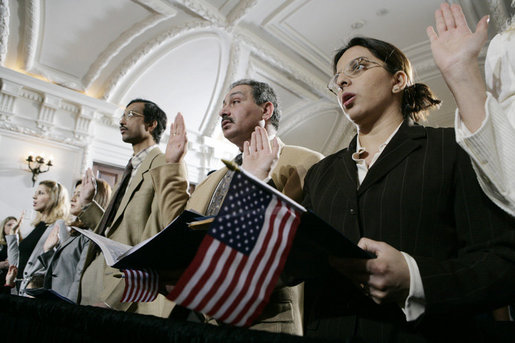Search results for the tag, "Immigration"
August 3rd, 2007

A few months ago, I was a “comprehensive” immigration-reform guy, which is to say that I supported “amnesty.”
But arguments from my friends in the rightroots, during the recently concluded Senate debate, caused me to question my boosterism. Here’s my admittedly cliched, quick precis:
America is a nation of immigrants, but we’re also a nation built on and strengthened through the rule of law. Put another way, America is our home, and newcomers should enter through the front door—legally—not backdoor their way in through an unlocked window or through amnesty.
Some would prefer to grant citizenship to those who have, say, lived in the U.S. for X number of years, maintained a clean criminal record, learned English, obtained gainful employment, etc. But amnesty undermines the rule of law and gives every incentive to those who are leaning toward illegal entry to do so. This is what happened the last time Congress tried to reform our immigration laws, in 1986: instead of addressing root causes, amnesty only enlarged America’s illegal alien population. Unsurprisingly, this is why reform is again so urgent.
Furthermore, amnestying those who have entered our home illegally does deep unjust to those who have waited in long lines and met our various requirements for citizenship.
Instead, the priority of immigration reform—indeed, the basic obligation of any government—must be to secure the nation’s borders and thus protect our national security. We can start by enforcing laws already on the books, like those that forbid employers from hiring illegal immigrants in the first place.
May 21st, 2007

Within the past year or so, two terms have became verboten within the conservative lexicon: “judicial activism” and “amnesty.” Both are so facile and, by now, shopworn, they have lost objective meaning and instead serve as means to hurl at one’s opponents.
So, in order to restore semantic sanity to the debates about the role of the judiciary and about immigration reform, let’s try to unravel some definitions.
“Judicial activism” occurs when the judiciary overturns a law that enjoys overwhelming public support. Hence the phrase “legislating from the bench.”
“Amnesty” is not automatically synonymous with earned citizenship. Instead, the operative question is how long an illegal must wait for legalized status.
If, after paying back taxes, fees and satisfying other conditions (like fluency in English, gainful employment and a clean criminal record), such status is conferred immediately, then that seems like amnesty. If such status must be earned over time, as with the 1986 bill that granted permanent residency after 18 months and citizenship after another five years, then I think invoking the scarlet noun minimizes the hardships associated with waiting.
For those who disagree—like Senator DeMint, who recently proclaimed, “I don’t care how you try to spin it, this is amnesty”—I’d ask you to describe a solution, short of deporting all illegals, which is not amnesty?
By all means, I’m no expert on these subjects; this is just my admittedly uninformed opinion. What do you think?
Addendum (6/16/2007): My litmus test for the “amnesty” label are the requirements for legalization. But as Time reporter Nathan Thornburgh observes, the more common test is legalization itself:
Whether you fine illegal aliens or stick them in English classes or make them say a hundred Hail Marys, at the end of the day, illegals would be allowed to stay and become citizens under this bill. That’s amnesty.
In other words, anything allowing those who came here illegally to stay here legally constitutes amnesty. To avoid amnesty, illegals must get in the back of the line for legal entry.
April 7th, 2007
Newt Gingrich takes to the op-ed page of the LA Times today to clarify his YouTubed remark equating Spanish with “the language of living in a ghetto.” His premise is as follows:
Mastering the language of a country opens doors of opportunity. . . . In the United States, English is by no means our only language, but it is the language of economic success and upward mobility.
This is so self-evident, I’m constantly dumbfounded when I run into someone (say, a server in the capitol building cafeteria, as I did yesterday) who shrugs and says, “No hablo Inglés.”
Of course, the ignorance of such people is their loss, not mine, and ignorance does not threaten me. What does threaten me, for instance, are multilingual ballots.
Why should ballots be unilingual? Because what makes America unique is our ability to assimilate immigrants. A common tongue gives us unity and thus strength. As Charles Krauthammer has argued,
The key to assimilation . . . is language. The real threat to the United States is not immigration per se but bilingualism and, ultimately, biculturalism. Having grown up in Canada, where a language divide is a recurring source of friction and fracture, I can only wonder at those who want to duplicate that plague in the United States. . . .
The way to prevent European-like immigration catastrophes is to turn every immigrant—and most surely his children—into an [English-speaking] American.
Indeed, this is why bilingual education—that is, being taught (usually in Spanish) while being gradually taught English—is misguided. As Krauthammer notes, “It delays assimilation by perhaps a full generation.”
To be sure, had I learned espanol while learning English (instead of blowing off classes in the former in high school), I bet I’d be fluent today. Research shows that learning a language is easiest when you’re young and the mind is sponge-like. Moreover, in part because of our geographic insulation, Americans are less worldly than our European counterparts, among whom bilingualism is the rule rather the exception. In the age of interconnectedness, speaking only one tongue—even if it’s the global one—surely puts us at a competitive disadvantage.
These objections are valid, but can both be addressed via immersion classes, instead of bilingual education. The difference—between English-first and English-second—is crucial, and, in fact, once one learns English, one should move on to Spanish.
March 28th, 2007
“Let’s not quibble,” Charles Krauthammer asserts. The immigration bill pending in Congress
grants the essentials of amnesty. True, there is a $5,000 fine (for a family of five!) attached to registering for legal status in the U.S. But the truly significant penalty for illegal immigration is deportation—which undoes everything the immigrant has built in America.
In other words, anything short of deportation qualifies as amnesty. But as Quin Hillyer points out, this is a mischaracterization:
Again and again and again, the mainstream anti-illegal immigration folks have said their preferred option is to get tough on border enforcement and get tougher on employers who hire illegals, and let the rest of the problem work itself over time by mere attrition. That is not a massive deportation scheme.
Note: Quin is referring to “mainstream” views, not those of Tom Tancredo.
December 6th, 2006

HR 4740, the Save Our Small and Seasonal Business Act, allows people in the United States via an H-2B visa to continue their hard work here for an additional year.
HR 4770 is necessary because the H-2B program permits only 66,000 visas per year—a cap that has not been expanded since it was enacted in 1990. Indeed, in 2005, this quota was reached by March.
Such myopia puts many small businesses in a catch-22. On one hand, they can curtail their output, which reduces profits and slows the economy. On the other hand, they can turn to illegal immigrants, which rewards illegal behavior and undermines respect for the rule of law. Both options are bad, which is why HR 4740 is important.
The bill exempts H-2B workers who have been gainfully employed during the past three years and abided by all the rules of their visa, from counting toward the cap.
The bill also contains various safeguards to protect American workers. For instance, employers must first recruit U.S. citizens (by advertising through the state and federal labor departments). Only if openings remain may they then hire H-2B workers. Furthermore, the one-year assignment must be a one-time occurrence, at the end of which visa holders must return to their country of origin.
June 26th, 2005
The New York Times reports: “At a moment when France is suffering from an unemployment rate of more than 10 percent, and Prime Minister Dominique de Villepin is waging what he calls a 100-day battle to combat it, [Adamski’s trip] is an effort to assure the French that Polish workers have no intention of stealing their jobs. Even if they wanted to, they could not. Under the treaty that allowed Poland and nine other countries to join the European Union last year, older members of the union can restrict access to their labor markets for up to seven years. Only Britain, Ireland and Sweden have allowed in workers from the new members.”
To be sure, the U.S. also practices nativism, particularly with respect to H-1B visas, which companies like Microsoft use to hire skilled professionals.
Fortunately, we still have people like Microsoft C.E.O. Bill Gates, who recently called the H-1B caps “almost a case of a centrally controlled economy.”
Fareed Zakaria crystallizes the point: “Every visa officer today lives in fear that he will let in the next Mohamed Atta. As a result, he is probably keeping out the next Bill Gates.”
Harry Binswanger draws the philosophical lesson, in an essay titled “‘Buy American’ Is Un-American”: “Economic nationalism, like racism, means judging men and their products by the group from which they come, not by merit.”




Scholars “use an intellectual scalpel…